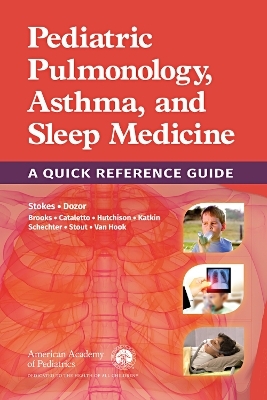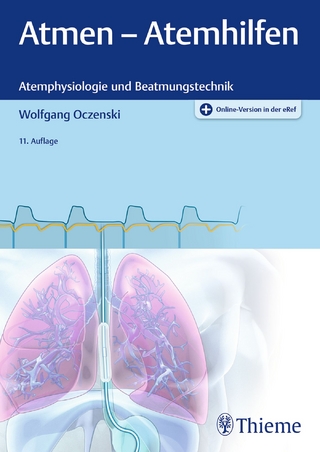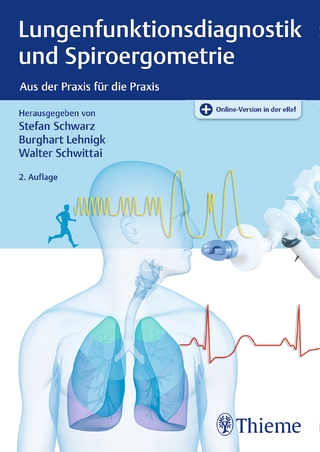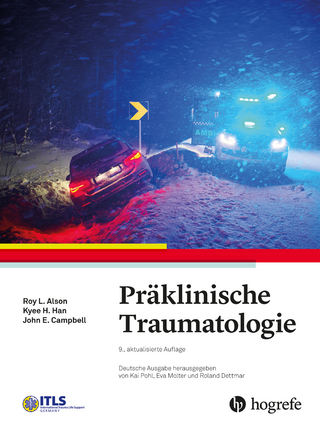
Pediatric Pulmonology, Asthma, and Sleep Medicine
American Academy of Pediatrics (Verlag)
978-1-61002-142-5 (ISBN)
Obtain practice-focused guidance on the diagnosis, evaluation, and treatment of the most commonly encountered pediatric respiratory conditions, asthma-related difficulties, and sleep disorders. Starting with the signs, symptoms, and conditions most commonly encountered in primary pulmonary care, the book provides advice for appropriate testing, treatment plans, and common complications for which to watch.
Topics include:
Evaluation of Children With Respiratory Disease
Anatomic Disorders and Congenital Anomalies of the Airway, Lungs, Pulmonary Vessels, and Chest Wall
Asthma and Related Conditions
Infections of the Respiratory Tract
Genetic Respiratory Diseases
Pediatric Sleep Medicine
Pediatric Respiratory Care
Miscellaneous Respiratory Diseases
Respiratory Disease in Association With Other Systemic Diseases
Special expanded sections on asthma, sleep medicine, and respiratory care provide non-specialists with the knowledge needed to effectively treat these often-complicated conditions. Each chapter is presented in a concise, bulleted format with tables and figures that make it easy to locate key information. Also included is direction on when to refer patients who require the care of a pulmonary specialist.
The American Academy of Pediatrics is an organization of 66,000 primary care pediatricians, pediatric medical subspecialists and pediatric surgical specialists dedicated to the health, safety and well-being of infants, children, adolescents and young adults. The AAP is the largest pediatric publisher in the world, with a diverse list of resources that includes essential clinical and practice management titles and award-winning books for parents. Dennis C. Stokes, MD, MPH, FAAP was St. Jude Children’s Research Hospital Professor of Pediatrics (University of Tennessee Health Science Center) and Chief of the Division of Pediatric Pulmonology and Sleep Medicine at Le Bonheur Children’s Hospital and St. Jude Children’s Research Hospital in Memphis, Tennessee and Director of the Pediatric Pulmonology fellowship from 2007-16. He has been Cystic Fibrosis (CF) Center Director at the University of Tennessee/Le Bonheur Children’s Hospital, Children’s Hospital at Dartmouth, and Vanderbilt Monroe Carroll Children’s Hospital. Dr. Stokes is a graduate of Wabash College in Indiana and received his medical degree from the University of Kentucky. He completed his residency in Pediatrics at the Johns Hopkins Hospital and his pulmonary fellowship at Children’s Hospital Boston. His MPH in Epidemiology is from Indiana University. He is currently board certified in Pediatrics and Pediatric Pulmonology and previously board certified in Critical Care. Dr. Stokes has divided his career between patient care, teaching, and research. He has participated in multiple clinical trials in CF beginning in 1990 and was on the inaugural Advisory Board of the Epidemiologic Study of Cystic Fibrosis (ESCF). He has served as chair of the Publications and Presentations Committee of the CFF Therapeutic Development Network (TDN) and Chair of the Scientific Assembly on Pediatrics and Board Member of the American Thoracic Society, as well as the AAP Executive Committee on Pulmonology and Sleep Medicine. He was co-principal investigator for the CHAMP (Changing High Risk Asthma in Memphis Thru Partnership) CMS Innovation Award. His primary clinical and research interests have included cystic fibrosis, asthma, pulmonary infections in the immunocompromised host, and pulmonary complications of childhood cancer therapy. Allen J. Dozor, MD, FCCP, FAAP has been Chief of Pediatric Pulmonology, Allergy, Immunology, and Sleep Medicine at the Maria Fareri Children’s Hospital at Westchester Medical Center since 1985. He is Professor of Pediatrics and Clinical Public Health at New York Medical College. He is Director of the Armond V. Mascia, MD Cystic Fibrosis Center, and Associate Physician-In-Chief at the Maria Fareri Children’s Hospital. He is Program Director of the Fellowship in Pediatric Pulmonology, and Director of the Children’s Environmental Health Center of the Hudson Valley (www.childrensenvironment.org). Dr. Dozor is a graduate of the University of Pennsylvania and received his medical degree from Pennsylvania State University. He is board certified in Pediatrics and Pediatric Pulmonology. Dr. Dozor divides his time between patient care, teaching, and research. He has participated as a principal investigator or co-investigator in dozens of clinical trials and studies. His current areas of research include asthma, cystic fibrosis, and respiratory physiology, with a particular focus on environment and respiratory disease in children. He edited a textbook on pediatric pulmonology (Primary Pediatric Pulmonology, Blackwell Publishing) designed for primary care providers, and published a guidebook for families of children with asthma and allergies (The Asthma and Allergy Action Plan for Kids, Simon and Schuster). He has also focused for many years on quality improvement of asthma care by primary care providers.
Part I. Evaluation of Children With Respiratory Disease
1. The Pediatric Pulmonary History
2. The Pediatric Pulmonary Physical Examination
3. Environmental History
4. Office Pulmonary Function Testing for the Primary Care Provider
5. Complete Pulmonary Function Tests
6. Imaging
7. Allergy Testing
8. Bronchoscopy
9. Oximetry and Capnography
Part II. Anatomic Disorders and Congenital Anomalies of the Airway, Lungs, Pulmonary Vessels, and Chest WallSection 1. Congenital Anomalies of the Airway
10. Choanal Atresia
11. Laryngomalacia
12. Vocal Fold Paralysis
13. Subglottic Stenosis
14. Tracheomalacia, Vascular Rings and Slings, and Bronchomalacia
15. Tracheoesophageal Fistulas
Section 2. Developmental Anomalies of the Lung and Pulmonary Vessels
16. Pulmonary Hypoplasia
17. Pulmonary Sequestration
18. Congenital Lobar Emphysema and Overinflation
19. Congenital Pulmonary Airway Malformation
20. Bronchogenic Cysts
21. Pulmonary Arteriovenous Malformations
Section 3. Structural Abnormalities of the Chest Wall
22. Chest Wall Deformities: Thoracic Insufficiency Syndrome
23. Pectus Deformities: Pectus Excavatum and Pectus Carinatum
24. Spinal Deformities: Idiopathic Scoliosis and Kyphoscoliosis
Part III. Asthma and Related Conditions
25. Diagnosis of Asthma
26. Tobacco Smoke Exposure and Children
27. Preventing and Treating Tobacco Dependence
28. Complementary and Alternative Medicine Therapies for Asthma
29. Allergic Rhinitis
30. Asthma Guidelines: Overview
31. Asthma Guidelines: Management of Acute Asthma
32. Asthma Guidelines: Management of Chronic Asthma
33. Pharmacologic Management: Short-acting Beta-Adrenergic Agonists
34. Pharmacologic Management: Long-acting Beta-Adrenergic Agonists
35. Pharmacologic Management: Inhaled Corticosteroids
36. Pharmacologic Management: Leukotriene Receptor Agonists
37. Pharmacologic Management: Anticholinergic Agents
38. Pharmacologic Management: Systemic Corticosteroids
39. Pharmacologic Management: Anti-Immunoglobulin E Therapy
40. Immunotherapy
41. Exercise-Induced Bronchoconstriction
42. Recurrent Croup and Bronchitis
43. Recurrent Wheezing in Infants, Toddlers, and Preschoolers
44. Allergic Bronchopulmonary Aspergillosis in Asthma
Part IV. Infections of the Respiratory TractSection 1. Airway Infections
45. Upper Respiratory Infections
46. Laryngitis
47. Epiglottitis
48. Croup
49. Papillomatosis
50. Pertussis
51. Bacterial Tracheitis
52. Bronchitis
53. Bronchiolitis
Section 2. Parenchymal Infections
54. Bacterial Pneumonia
55. Viral Pneumonia
56. Mycoplasma Pneumonia
57. Chlamydial Pneumonia
58. Tuberculosis
59. Nontuberculous Mycobacterial Pulmonary Disease
60. Fungal Pneumonia
61. Histoplasmosis and Other Endemic Fungal Pneumonias
62. Complications of Pneumonia: Pleural Effusions
63. Complications of Pneumonia: Empyema
64. Complications of Pneumonia: Pulmonary Abscess
65. Complications of Pneumonia: Postinfective Bronchiolitis Obliterans
Part V. Genetic Respiratory Diseases
66. Disorders of Surfactant Metabolism
67. Cystic Fibrosis
68. Cystic Fibrosis Newborn Screening
69. CFTR-Related Metabolic Syndrome and Cystic Fibrosis Screen Positive, Inconclusive Diagnosis
70. Primary Ciliary Dyskinesia
Part VI. Miscellaneous Respiratory Diseases
71. Bronchopulmonary Dysplasia
72. Pneumothorax
73. Pulmonary Aspiration: Foreign Bodies and Massive
74. Gastroesophageal Reflux and Recurrent Small Volume Aspiration
75. Hypersensitivity Pneumonitis
76. Pulmonary Hemorrhage
77. Pulmonary Hypertension
78. Vocal Cord Dysfunction
79. Tic Cough (Habit Cough)
80. Smoke Inhalation
81. Hydrocarbon Aspiration
82. Drowning
83. Thoracic Tumors
84. Pulmonary Complications of Chemotherapy
85. Children’s Diffuse and Interstitial Lung Disease
Part VII. Respiratory Disease in Association With Other Systemic Diseases
86. Pulmonary Complications of Immune Deficiencies
87. Sickle Cell Disease
88. Respiratory Disease in Children With Congenital Heart Disease
89. Respiratory Disease in Children After Cardiac Surgery
90. Collagen Vascular-Related Lung Disease
91. Vasculitis-Related Lung Disease
92. Granulomatous Lung Disease
93. Respiratory Disease Associated With Gastrointestinal and Hepatic Disease
94. Pulmonary Complications of Cerebral Palsy and Neurodegenerative Diseases
95. Pulmonary Complications of Neuromuscular Disease
96. Respiratory Disease in Cancer Survivors
Part VIII. Pediatric Sleep Medicine
97. Brief, Resolved, Unexplained Events and Sudden Infant Death Syndrome
98. Obstructive Sleep Apnea Syndrome
99. Congenital Central Hypoventilation Syndrome
100. Insomnias
101. Excessive Somnolence
102. Narcolepsy
103. Parasomnias
104. Sleep History and Sleep Hygiene
105. Circadian Rhythm Disorders / Circadian Rhythm Sleep Disorders
Part IX. Pediatric Respiratory Care
106. Delivery of Inhaled Medications
107. Small Volume Nebulizers
108. Metered Dose Inhalers
109. Dry Powdered Inhalers
110. Spacers and Holding Chambers
111. Inhaled Antibiotics
112. Oxygen Therapy
113. Tracheostomy Care and Complications
114. Airway Clearance Devices and Techniques
115. Continuous Positive Airway Pressure
116. Bilevel Positive Airway Pressure
117. Home Mechanical Ventilation
118. Diaphragm Pacing by Phrenic Nerve Stimulation
| Erscheinungsdatum | 23.07.2018 |
|---|---|
| Verlagsort | Elk Grove Village |
| Sprache | englisch |
| Maße | 152 x 229 mm |
| Gewicht | 1681 g |
| Themenwelt | Medizinische Fachgebiete ► Innere Medizin ► Pneumologie |
| Medizin / Pharmazie ► Medizinische Fachgebiete ► Pädiatrie | |
| Medizin / Pharmazie ► Pflege ► Fachpflege | |
| ISBN-10 | 1-61002-142-8 / 1610021428 |
| ISBN-13 | 978-1-61002-142-5 / 9781610021425 |
| Zustand | Neuware |
| Haben Sie eine Frage zum Produkt? |
aus dem Bereich


